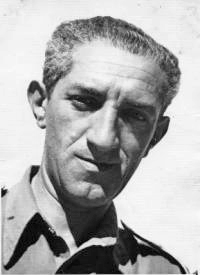He fought in wars for Poland, introduced new musical genres and created songs that Poles still sing to this day. The talent of Henryk Wars was also recognised in Hollywood.
Henryk Wars was born in Warsaw in 1902, then in the Russian Empire, within the borders of the Kingdom of Poland established by the Russian occupier. The future outstanding Polish composer was born into a musically talented Jewish family.
In 1906, he and his parents left for France, from where he returned in 1914. After the end of the First World War in 1918, Poland regained its independence. Unfortunately, the recently revived Polish state was overshadowed by a threat from the east – war with Bolshevik Russia. Henryk Wars (actually Henryk Warszawski) volunteered for the army to defend his homeland.
Forerunner of jazz in Poland
After the victorious war, he started studying law and art. The conductor, composer and violinist Emil Młynarski recognised his talent and directed him to Professor Roman Statkowski. Wars did well but his heart was always drawn to jazz. On his initiative the first jazz bands were formed in the Polish Republic.
In his student days, Wars played the piano in Warsaw cabarets. Soon he became the musical director of the record company “Syrena Rekord”. He also served as a conductor there. However, it was his performance as a composer that brought Wars the greatest fame. The breakthrough in his career was the piece “Let’s dance the tango”, which was performed by a pair of Polish actors: Stanisława Nowicka and Eugeniusz Bodo. Henryk was becoming increasingly recognisable. Songs composed by him were sung by Hanka Ordonówna, Mieczysław Fogg, Adolf Dymsza – the best performers and actors of pre-war Polish cinema.
Wars did not forget about jazz. Together with Leon Boruński, he hosted the programme “Jazz for two pianos”. The jazz trio he founded included the previously mentioned Bodo and Tadeusz Olsza.
Composer of film music
He gained great fame for his compositions for films. Henryk Wars’ music could be heard in more than 50 films of the pre-war Polish cinema. Poles still sing his songs today, both on stage and at home. They include such songs as: “Only in Lwów, (Tylko we Lwowie)”, ” Cold Bastard (Zimny drań)”, “Love Will Forgive You Everything (Miłość ci wszystko wybaczy”, “Sex appeal”, “I Have a Date with Her at Nine (Umówiłem się z nią na dziewiątą)”, “Oh how lovely (Ach, jak przyjemnie)”, ” Sleep my love (Śpij kochanie)”, “Tońko Lulleby (Dobranoc oczka zmruż)”. Perhaps some people do not even realise that these songs were composed by Henryk Wars.
Music and war
Germany invaded Poland on 1 September 1939, starting the Second World War. Henryk Wars had already answered the call of his homeland before. Once again, he stood in the ranks of the Polish Army to repel the invaders. Unfortunately, the Germans dismantled his unit after a few days, and he was taken prisoner. The danger was exacerbated by the fact that Wars was of Jewish origin. So, he decided to escape, which he succeeded. However, he soon found himself in a second, this time Soviet, captivity.
Soviet troops invaded Poland on 17 September 1939, as a result of the arrangements made in August 1939 between Joseph Stalin and Adolf Hitler (the Molotov-Ribbentrop Pact). The agreement stipulated the division of Central European lands between the two criminal totalitarian regimes.
Wars managed to get to Lwów (today’s Lviv), where he formed the band “Tea-Jazz”. He gave concerts in various places in the Soviet state.
In June 1941 Hitler invaded the Soviet Union. In this new situation, Polish-Soviet talks took place, which led to the signing of a treaty allowing the formation of Polish army units on the territory of the USSR. Most of a new army were Polish citizens who had been deported and exiled by force deep into the Soviet state. In 1942, Henryk Wars joined the ranks of this army, commanded by General Władysław Anders.
In the army, he formed the band “Polish Parade”. Together with the army, he completed its entire combat route. When it left the Soviet Union, it made its way to Iran. Then the Poles headed west to Palestine. They fought the German Nazis in North Africa and Italy. Together with Michał Waszyński, Wars made a film about General Anders’ army titled. “The Great Road.” In Italy, he was awarded the Cavaliere della Croce medal and his artistic team was recognised as the best among the Allies.
His career in Hollywood
After the end of the Second World War, Wars was demobilised. He left for England but dreamt of a career in Hollywood. Already in 1947, he found himself in Los Angeles, where he struggled financially during his early years. He and his wife were unable to find work, so his family lived on the edge of poverty. However, he continued to compose and did not forget about music.
His persistence paid off. In the early 1950s, he composed the music for a film directed by Harry L. Fraser, “Chained for Life”. This brought him success and his career soared. His real breakthrough, however, occurred in 1955, when he wrote the music for the comedy production “Ski Crazy!”, directed by Gordon McLean.
His music could be heard in more than 30 TV series and films, including ‘China Doll’, ‘My Friend the Dolphin’ and ‘Bonanza’. His songs have been performed by such greats as Bing Crosby and Jimmy Rogers. He also collaborated with John Wayne in the filming of westerns.
In the 1970s. Henry Wars became seriously ill. After a long illness, he died on 1 September 1977 in Los Angeles.





